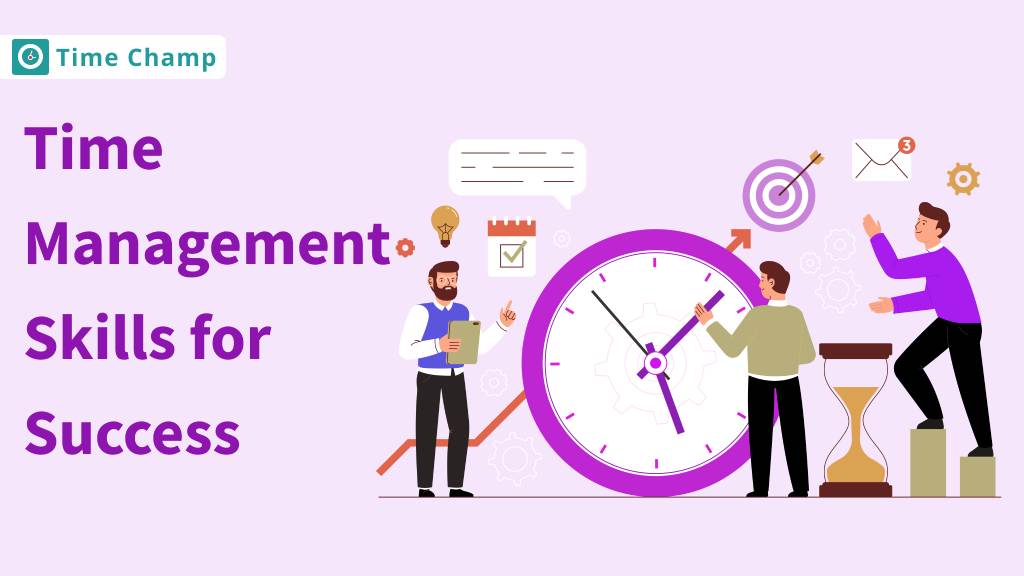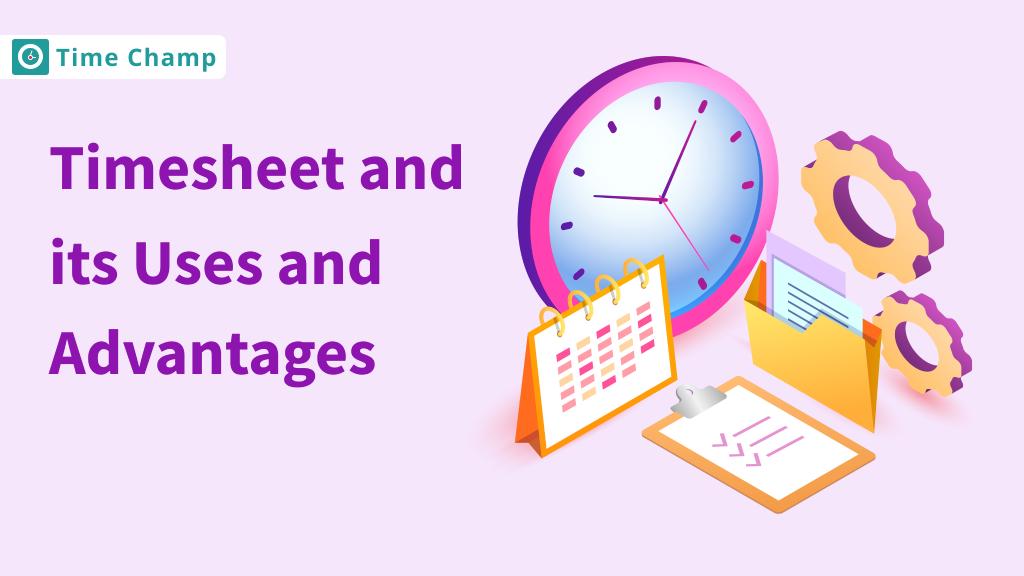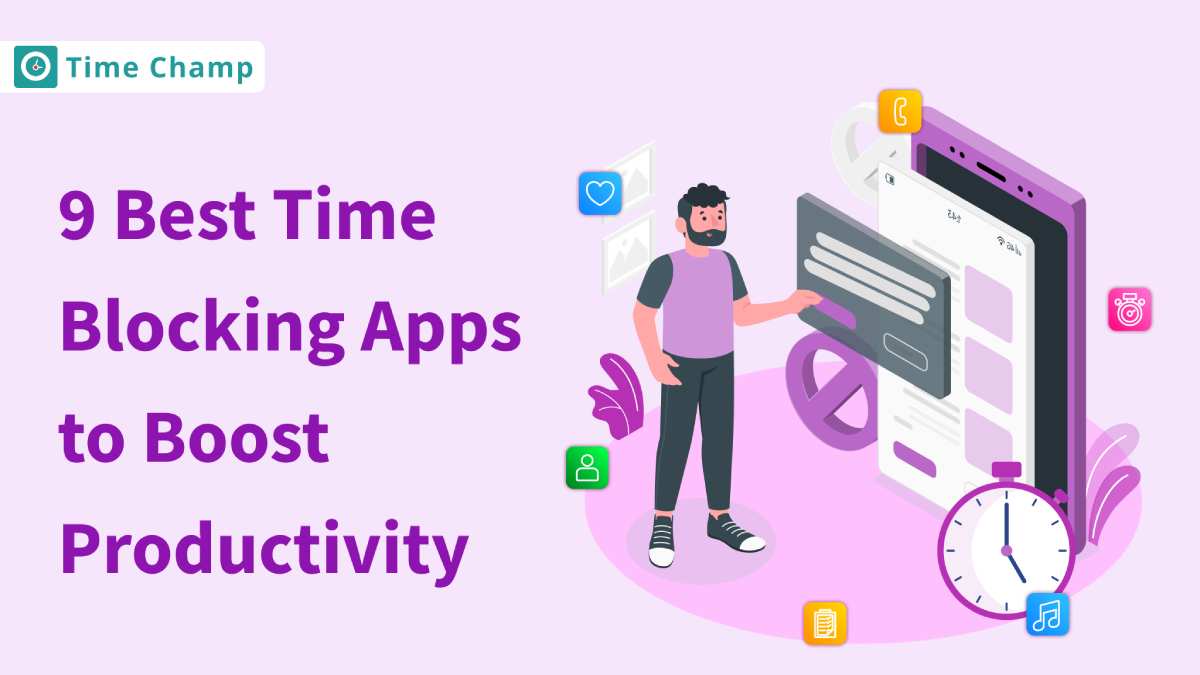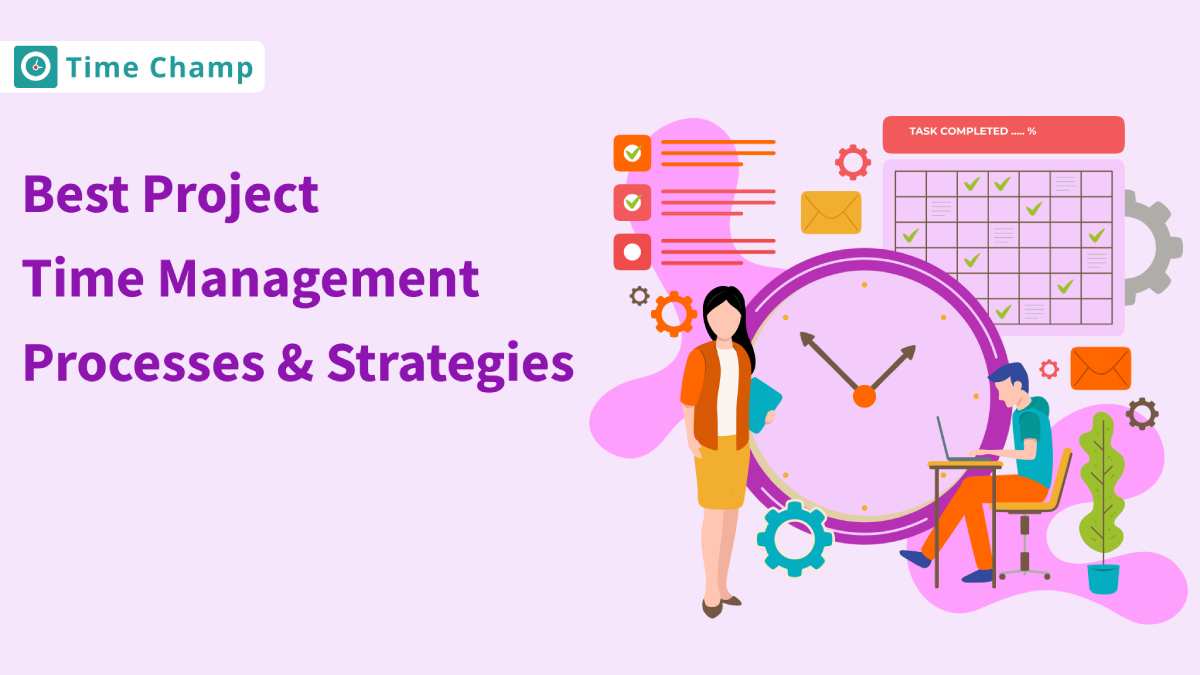Have you ever asked yourself how some
people manage to do all the things
and still have time left for
themselves?
This isn’t magic –
it’s mastering time management
skills!
In this blog, we will
discuss the most effective tips that
can help you manage your time and
reduce stress levels by transforming
your to-do list into a success
story.
Let’s get started!
What are Time Management Skills?
Time management skills are those that help you plan, organize, and manage how you spend your time effectively to achieve goals and complete tasks. To improve productivity, reduce stress, and achieve a good work-life balance, these skills are necessary.
Why are Time Management Skills Important?
Imagine your day filled with juggling
multiple tasks, leading to stress
and reduced
productivity.
Hectic!
Right?
For instance, if you are
working on a big project, it is
essential to allocate a specific
number of hours per day for
research, planning, and writing.
Effectively managing your time
improves creativity and work
proactivity, which makes it possible
for you to tackle tasks and goals
systematically.
Key Time Management Skills
Establish Specific Objectives
It is the first and major step for
any time management. You wouldn’t
start cooking without knowing the
recipe and gathering ingredients.
Would you?
Just like you
wouldn’t cook without a recipe, you
shouldn’t start a project without
clear objectives.
Set SMART
(Specific, measurable, achievable,
relevant, and time-bound) goals, and
divide them into tasks. Set
timeframes for each task which helps
you to stay focused and organized.
Create a detailed action plan
outlining the necessary steps and
responsibilities, review your
progress regularly, and adjust as
needed.
Prioritize Your Tasks
You need to know that time
management is all about
prioritizing tasks.
Yes! It’s
true!
Organize the tasks based
on the urgency. Not every task
deserves the same priority. Some
might be unimportant, and you should
be able to categorize them. If you
ever feel stuck trying to prioritize
your tasks, try the Eisenhower
matrix method where the tasks will
be categorized into four categories.
Urgent and
Important
Important but Not
Urgent
Urgent but Not
Important
Not Urgent and Not
Important
By using this matrix,
you can effectively prioritize your
tasks and focus on what matters
most.
Delegation
Time
management is another area
that is well served by delegation.
It means assigning tasks to others
so that you can focus on more
important things.
For instance,
if you oversee a project, delegating
some tasks to your team members
allows you to focus on the bigger
picture of the project while
ensuring that all the tasks are
completed. This makes your work
easier to manage and allows others
to chip in, which increases
efficiency.
Time blocking
Time
blocking is an effective
time management technique that
involves partitioning the day into
segments for specific activities.
For instance, you may allocate
time to respond to mails from 9:
00A.M to 12:00 P.M., and 2: 00P.M –
4: 00P.M for team meetings, etc.
Each time slot is linked to a
specific task which helps in
organizing the day by improving time
management.
Avoid Procrastination
To eliminate procrastination, you
must understand what leads to
procrastination, whether it is
distractions or the number of tasks.
Consider the Pomodoro
Technique, where you work
for 25 minutes (considered as a
segment) followed by a 5-minute
break for every single segment. This
results in the development of a
perception of time pressure and
reduces the experience of overload
thus increasing
efficiency.
Task Batching
Task batching is a time
management technique that
involves grouping similar tasks and
then handling them in a dedicated
block of time.
For instance,
if you must check emails, make phone
calls, and create reports, simply
group them. Allocate specific time
to perform each task which increases
efficiency.
Manage Stress Levels
One of the hectic moments in everyone’s life is “Stress”. Managing stress is also an art. There are some successful ways to fight with stress:
- Get enough sleep: You may usually think it’s fine to have less sleep for a day. But it’s not! When you are well rested, your mood is better and you can handle stress better. To improve your stress management, maintain a regular sleep schedule, establish a relaxing bedtime ritual, and ensure that your sleeping conditions are ideal.
- Take Regular Breaks: Continuous work or focused work without any breaks can lead to stress and low productivity. Regular breaks allow your mind and body to recharge, reduce fatigue, and improve concentration.
- Eat Healthy Food: Yes! Stress
can be controlled through proper
diet because it enhances brain
functioning and helps stabilize
the mood.
Healthy foods such as fruits, vegetables, and whole grains enhance the brain and control stress hormones as compared to foods that contain sugar and fats that are likely to enhance anxiety.
Work-life Balance
Work-life balance is an important skill in time management. There are times when you should prioritize your work first, but not every time. It is crucial to set aside time for hobbies, social interactions, spending time with family, friends, etc. You should prioritize your personal and professional life equally.
Learn to Say ‘No’
You might think this sounds rude but
it is not!!
When you are
already overloaded with your work,
and someone asks you to complete
tasks that aren’t very important,
it’s fine to say, “I’m sorry, but
I’m unable to do that right now!”
Consider the value of time:
once it’s spent, it’s gone.
Prioritizing your current
commitments makes sure that you can
focus on what truly matters and
maintain high-quality work.
Tips to Improve Your Time Management Skills
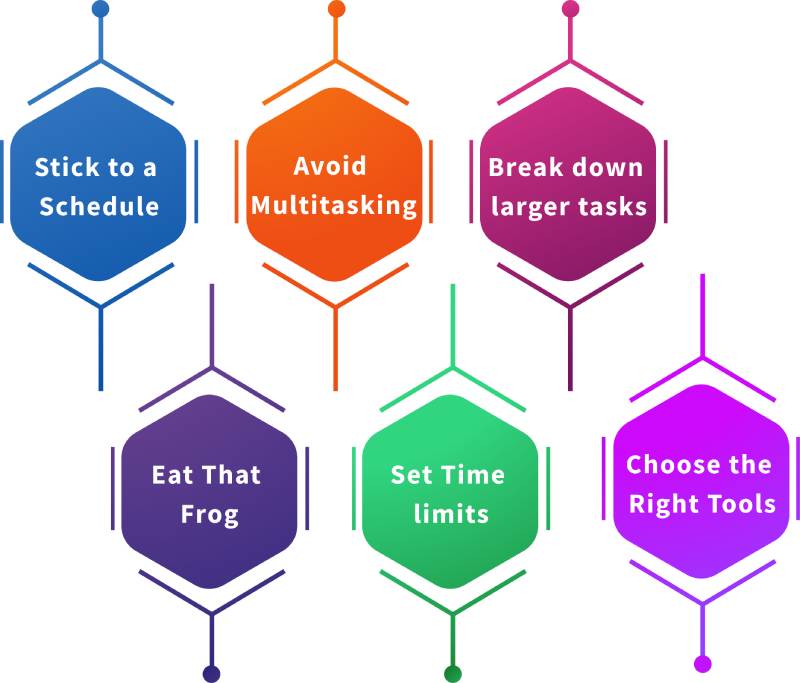
Stick to a Schedule
Imagine you started a work and got
interrupted by other work and then
you forgot about the primary task.
Isn’t it clumsy?
It is ok
to be flexible and adaptable but
sticking to a structured schedule
can help you to stay focused and on
track. This planning helps you to
improve your time
management skills a lot.
Avoid Multitasking
Many people think multitasking helps
to boost their productivity as they
have this feeling that they’re
saving time by allocating the same
time to do multiple tasks.
But
it isn’t true!
It is better to
avoid multitasking. When you focus
on different tasks at a time, it
leads to clumsiness and confusion
where none of the tasks will be
completed properly, leading to
errors and delays.
Break down larger tasks
Don’t ever try to complete a big task
at once. You may complete it, but it
doesn’t have any value since the
outcome doesn’t reflect what you
expect.
Divide larger tasks
into smaller steps, which will be
less overwhelming and easy to
tackle. By focusing on each small
part at one time, you make the
overall task more approachable and
get a clearer sense of progress.
Eat That Frog
Well! It may sound strange, but it is
one of the most effective time
management tips.
It means
completing the difficult and
important task first – (frog) which
consumes a lot of time to complete.
Thus, “eat that frog,” is another
way of saying that if you have two
important things to do, do the one
which is the biggest, hardest, and
most important one. By this, you can
save time by completing the hardest
one as soon as possible by not
lagging it till the end of the day.
Set Time limits
If you plan to perform two activities
in a day that would take 2 hours
each, you are likely to spend the
whole day working on it. Set
yourself reasonable time limits to
complete tasks, so that you can
complete these tasks earlier than
you estimated.
This principle
requires the setting of realistic
and tight time frames to avoid time
wasting.
Choose the Right Tools
Sometimes you won’t be able to
calculate where your time is spent.
Choosing the right tools can help
you with time management by boosting
productivity and organizing your
tasks.
Time-tracking
software like Time
Champ helps you
stay focused and productive by
tracking how much time you spend on
each task. It automatically records
the time spent on different
activities and creates simple
reports, giving you a clear view of
your daily schedule. This helps you
see where your time goes, so you can
improve and use it more wisely. Time
Champ also enables you to set goals
and track progress in order to keep
on top of your work. It makes task
managing easier and boosts
productivity. Additionally, it helps
track employee work hours, showing
how much time they’ve spent on each
task and how many tasks they’ve
completed in a day. You can easily
schedule tasks and receive timely
notifications to keep everything on
track.
By choosing the right tools and using
them effectively, you can improve
your time management skills and
achieve better results in your
work.
The above tips are
effective and essential to improve
your time management skills.
Implement them and master time
management.
Conclusion
Time management skills are crucial in achieving goals and work-life balance. By implementing essential tips, you can improve your time management skills. Using software like Time Champ, you can monitor progress and enhance your productivity as well. If you use these strategies, you will be able to manage your time better and work better.
Manage your time effortlessly with Time Champ—start tracking effectively today!
Signup for FreeBook DemoFrequently Asked Questions
Time management is crucial as it helps you stay organized and get more done. When you use your time wisely, you can finish tasks quicker, and feel less stressed. Good time management lets you work smarter, not harder and helps you feel good about what you accomplish.
If you feel stressed, try breaking your tasks into smaller, simpler steps. Focus on the most important tasks first. Set easy goals and make a daily schedule to keep you on track. Also, learn to say “no” to things that are not necessary so you don’t take on too much.
Yes! Time management can reduce stress at work. When you plan your tasks accordingly, and stay organized, you are less likely to waste time on unnecessary things. If you set goals for yourself and track your tasks, you will be more confident without getting stressed out.
To prioritize tasks, think about what’s most important for your goals and deadlines. You can ask yourself which tasks matter the most. Important tasks should come first, and less urgent ones can wait or be handed to someone else.

